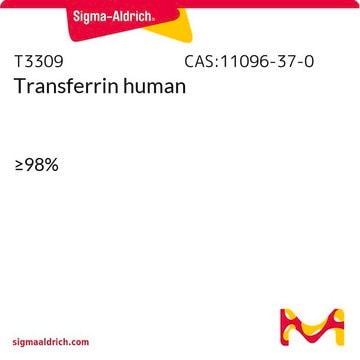L1294
Lactoferrin human
recombinant, expressed in rice, Iron saturated, ≥90% (SDS-PAGE)
Synonyme(s) :
Holo Transferrin
About This Item
Produits recommandés
Source biologique
human
Niveau de qualité
Produit recombinant
expressed in rice
Type
for cell culture
Pureté
≥90% (SDS-PAGE)
≥90% (biuret)
Forme
powder
Technique(s)
microbiological culture: suitable
Impuretés
≤10 EU/mg endotoxin
Numéro d'accès UniProt
Température de stockage
2-8°C
Informations sur le gène
human ... LTF(4057)
Vous recherchez des produits similaires ? Visite Guide de comparaison des produits
Application
Actions biochimiques/physiologiques
Code de la classe de stockage
11 - Combustible Solids
Classe de danger pour l'eau (WGK)
WGK 3
Point d'éclair (°F)
Not applicable
Point d'éclair (°C)
Not applicable
Équipement de protection individuelle
Eyeshields, Gloves, type N95 (US)
Certificats d'analyse (COA)
Recherchez un Certificats d'analyse (COA) en saisissant le numéro de lot du produit. Les numéros de lot figurent sur l'étiquette du produit après les mots "Lot" ou "Batch".
Déjà en possession de ce produit ?
Retrouvez la documentation relative aux produits que vous avez récemment achetés dans la Bibliothèque de documents.
Les clients ont également consulté
Notre équipe de scientifiques dispose d'une expérience dans tous les secteurs de la recherche, notamment en sciences de la vie, science des matériaux, synthèse chimique, chromatographie, analyse et dans de nombreux autres domaines..
Contacter notre Service technique














